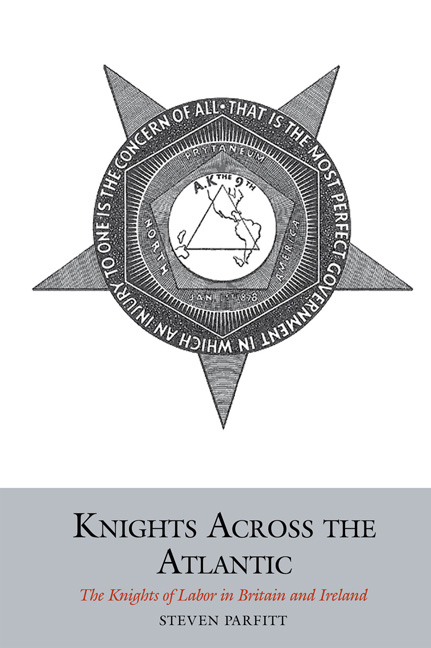Book contents
- Frontmatter
- Contents
- Acknowledgements
- Introduction: The World of the Knights of Labor
- 1 Origins
- 2 The Rise of a Transnational Movement
- 3 Organisation, Culture and Gender
- 4 The Knights in Industry
- 5 The Knights and Politics
- 6 The Knights and the Unions
- 7 The Fall of a Transnational Movement
- Conclusion: The Knights of Labor in Britain and Ireland
- Appendix: List of Known Assemblies of the Knights of Labor in England, Scotland, Wales and Ireland
- Bibliography
- Index
3 - Organisation, Culture and Gender
- Frontmatter
- Contents
- Acknowledgements
- Introduction: The World of the Knights of Labor
- 1 Origins
- 2 The Rise of a Transnational Movement
- 3 Organisation, Culture and Gender
- 4 The Knights in Industry
- 5 The Knights and Politics
- 6 The Knights and the Unions
- 7 The Fall of a Transnational Movement
- Conclusion: The Knights of Labor in Britain and Ireland
- Appendix: List of Known Assemblies of the Knights of Labor in England, Scotland, Wales and Ireland
- Bibliography
- Index
Summary
On 23 November 1885, about 120 members of Local Assembly 3504, the Alpha Assembly, sat down to their first anniversary dinner at the Rose and Crown Hotel, Sunderland. The lodge room of the hotel, as one newspaper described it, ‘was tastefully decorated for the occasion, the four walls being draped and festooned with variegated bunting and national flags, prominent among which were the Union Jack and the Stars and Stripes.’ After a ‘very excellent repast, served up under the personal superintendence of Mr. Wingate, manager of the hotel,’ the leaders of the assembly made a series of toasts, to the ‘Alpha Assembly of the Knights of Labor,’ ‘The Mayor and Corporation,’ ‘Trade and Commerce’ and then ‘The General Assembly of the Knights of Labor in America.’ The assembly's secretary, Joseph French, gave a short address on its history. The night was then given over to music and dancing, poetry and dialogue, and the anniversary ended with a hearty rendition of ‘Auld Lang Syne.’
Of the many intriguing symbols present that evening, the Union Jack and the Stars and Stripes are the most obvious. They are also the most pertinent to this chapter, which is concerned with the cultural practices and organisational methods of the British Knights of Labor, and the ways in which they adhered to and departed from the practices and methods that American Knights laid down for them. We see whether British Knights followed or deviated from the cultural and structural forms of their adopted order. We explore how other workers, not themselves affiliated with the Order, adopted its name and model for their own purposes. We finally address the reasons why British Knights failed to organise women workers, even though their counterparts organised them in large numbers in the United States. These three interrelated questions all point to wider questions of cultural and social similarities and differences between Britain and the United States – between the Union Jack and the Stars and Stripes. They raise further questions about the nature of transnational labour movements, and of the attractions of these movements for workers in other, culturally distinct countries. The Knights of Labor began its history in 1869 as a fraternal order. Its founder, Uriah Stephens, based its secrecy (later dropped), its titles (later altered), and its complex ritual and ceremonies (later simplified) on his experience of the Freemasons, Oddfellows and other fraternal orders.
- Type
- Chapter
- Information
- Knights Across the AtlanticThe Knights of Labor in Britain and Ireland, pp. 79 - 108Publisher: Liverpool University PressPrint publication year: 2016



